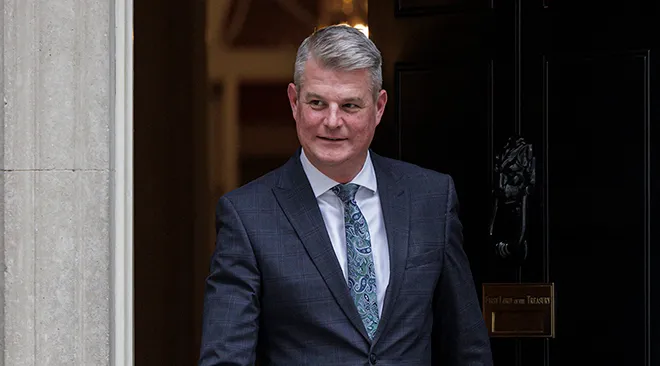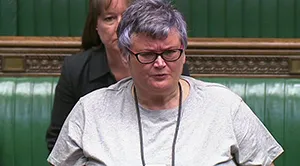 During yesterday’s debate on the Gambling White Paper proposal surrounding financial vulnerability checks, MP Stuart Andrew reiterated that the Government and the Gambling Commission are planning to move forward with enforcing the introduction of the said checks.
During yesterday’s debate on the Gambling White Paper proposal surrounding financial vulnerability checks, MP Stuart Andrew reiterated that the Government and the Gambling Commission are planning to move forward with enforcing the introduction of the said checks.
The debate followed a petition concerning the issue, which was created by Jockey Club Chief Nevin Truesdale and reached 100,000 signatures. Mr Truesdale, along with other representatives of the horse racing industry, is against the implementation of the financial checks that will require online betting operators to check a client’s financial situation should they lose £125 within a month or £500 in a year. In addition to the aforementioned audits, enhanced checks will target potential victims of binge gambling if they incur a net loss of £1,000 within 24 hours or losses of £2,000 within 90 days.
The Arguments Cautioning Against the Measure Concern Both Gambling Harm and the Horse Racing Industry
 Stuart Andrew’s speech followed a series of arguments by MPs who were in agreement with opponents of the bill. An important factor that was considered was that of the illegal sports betting market. According to MPs, the checks would push bettors, especially problem gamblers, towards black market sportsbooks.
Stuart Andrew’s speech followed a series of arguments by MPs who were in agreement with opponents of the bill. An important factor that was considered was that of the illegal sports betting market. According to MPs, the checks would push bettors, especially problem gamblers, towards black market sportsbooks.
MP Philip Davies and other MPs also brought up the issue of bettors’ freedom to choose how they can spend their money, with Mr Davies deeming the proposed checks “unacceptable” and condemning how punters do not have a say in the debate.
Another topic that played a crucial part in the debate was the effect the checks would have on the horse racing industry. Mr Davies and other MPs spoke in defence of the horse racing industry’s position on the matter, and points were raised regarding the importance of British horse racing, the sector’s reliance on sports betting, and how it will be harmed if the checks divert betting traffic to the unregulated market. MP Laurence Robertson pointed out that around “40% of racing’s income comes from betting companies” and said that “racing cannot take any more financial setbacks.”
MPs also called for a distinction between betting, which is skill-based, and games of chance. In addition, Mr Davies, who ultimately does not see the policy as good nor evidence-based, nonetheless proposed for vulnerability checks to be made based on the Steering Committee on Reciprocity (SCOR) data, which considers inability to pay rent, mortgage payments, and other such factors to be risk indicators. This would, therefore, make the checks more accurately represent vulnerability.
Proponents Argued that the Affordability Checks Will Protect Vulnerable Bettors
 MPs in favour of the checks also participated in the debate. MP Carolyn Harris, an avid advocate for the treatment and prevention of problem gambling, argued that the checks would not affect those not at risk of gambling harm. She specifically quoted research by Dr Philip Newall from the University of Bristol and Dr David Zendle from the University of York on how, on average, gamblers tend to wager no more than £16.41 per month, far below the threshold of the checks. Carolyn Harris also claimed that the checks would target roughly 3% of online gambling accounts and that, according to research, a mere 0.3% of clients would be subject to manual checks. She also believed that the industry had “exaggerated” the level of intrusion, a point that was later contested by opponents of the checks.
MPs in favour of the checks also participated in the debate. MP Carolyn Harris, an avid advocate for the treatment and prevention of problem gambling, argued that the checks would not affect those not at risk of gambling harm. She specifically quoted research by Dr Philip Newall from the University of Bristol and Dr David Zendle from the University of York on how, on average, gamblers tend to wager no more than £16.41 per month, far below the threshold of the checks. Carolyn Harris also claimed that the checks would target roughly 3% of online gambling accounts and that, according to research, a mere 0.3% of clients would be subject to manual checks. She also believed that the industry had “exaggerated” the level of intrusion, a point that was later contested by opponents of the checks.
MP Stuart Andrew also spoke on the issue of financial checks, saying he saw the proposals to “represent a significant improvement for both businesses and customers” and confirmed that the plans to proceed with their implementation have not been halted. According to him, the concerns of the horse racing industry are recognised, and the Government and the Gambling commission are aiming to “balance” bettors’ freedom with the necessity to address gambling harm.
Mr Andrew continued, stressing that the affordability checks are going to solely affect online betting, not wagering that takes place at land-based betting shops. He also emphasised that he takes the issue of the unregulated market “very seriously” and that the White Paper includes measures that will give the UKGC more powers to tackle this problem. Mr Andrew also ultimately claimed that it is crucial to guarantee that neither the horse racing industry nor customers will be negatively affected by the affordability checks.
- Author


